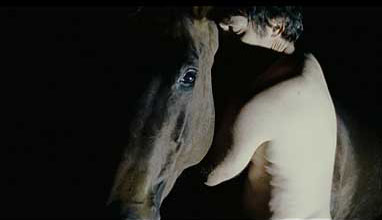
In 2005, a man in Washington state died from internal bleeding due to injuries he sustained from having sex with a horse. You probably remember reading about it, as it’s the only news story you’ve encountered in the last few years in which a man was fucked to death by a horse.
Robinson Devor has made a documentary about the incident. Or, more accurately, he’s made a documentary about the deeper difficult, uncomfortable and, ultimately, important questions the incident inadvertently raised.
Given the sensationalistic subject matter, and the way it was treated by the media and lawmakers at the time—more explosively in Washington, where it began a debate leading to bestiality becoming an on-the-books crime there—Devor’s film is a study in restraint. Not merely objective, it’s remote and removed, not casting judgment because it’s not a film about things that can be judged, like bestiality or zoophilia, but about the emotions and impulses behind bestiality and zoophilia.
As a piece of filmed journalism, it’s a rather remarkable work, particularly in terms of access to people who obviously don’t want attention. (Charles Mudede, who covered the incident for altweekly the Seattle Stranger in 2006, contributed to the writing of the film). We hear from local law enforcement in interviews, and some snippets from the media (including what sounds like an uncharacteristically thoughtful Rush Limbaugh), but we also hear quite a bit from the friends and fellow “zoos” of the man who died, known only as “Mr. Hands.”
They don’t physically appear in the film at all, and none of their names are named. Devor instead lenses the beautiful landscapes and lonely geography of the area, and stages artsy reenactments of some scenes, giving them the illusion of fly-on-the wall veracity, sans real dialogue. Often shot from afar and keeping the actors’ faces out of the frame or in shadow, the reenactments are merely visual accompaniment used to buttress the sole strand of real information—the interviews themselves.
What emerges is a surprisingly mundane picture, despite the haunting soundtrack and reels of dark, lonely nighttime imagery. The zoos would find each other on the Internet, and meet and feel each other out in person, before being invited to a ranch, where they would gather for potlucks, barbeques and conversations about work and family, before heading out to the barn to let horses and bulls have sex with them.
Though Mr. Hands did indeed die, no law was actually broken at the time, although arrests—and plenty of aspersions—were made. The zoos were accused of animal cruelty, as one lawmaker compared their actions to child abuse, since animals, like children, can’t give consent.
And here’s where things get ambiguous, because it wasn’t man-on-horse sex, but horse-on-man. As the radio voice that sounded like Limbaugh’s pointed out, the animals kind of have to consent, since they’re the ones doing the penetrating on the willing men.
If we’re to draw an ethical line in the sand regarding animal consent, surely that same horse who didn’t consent to fucking Mr. Hands to death didn’t consent to having his balls cut off by veterinarians after the incident, either. Nor does any horse ever consent to be ridden, or to run races, or to be hitched to a cart or or plow, or to be put down and turned to glue or dog food.
One of the zoos points out that the stallions were male animals, doing what is natural for male animals—trying to spread their seed to propagate the species.
“They don’t care if it’s a filly underneath them or a human,” he says. Which is probably true, but “it’s only natural” makes for an odd bit of rhetoric for a defender of the act to engage in, since the horse may be doing what it considers natural, but surely the human male animals involved are acting against what is natural for humans. After all, they’re not spreading their seed in the act, and it’s not like there’s any chance of them bringing a child (or horse or centaur) to term after such events.
Devor can’t—or, at least, doesn’t— point this out or ask for clarification, though. If an interview was involved, we only hear the answers, not the questions. Those are all implied, and left to hang over the heads of the audience.
Given the subject matter, it’s safe to say this is one of the more unusual and challenging films you’ll see this year. But given the way it’s made, with it’s also one of the most immersive and affecting.
Zoo screens Thursday and Friday, September 13 and 14, at 9 p.m. at the Wexner Center for the Arts’ Film/Video theater. For more info, click to wexarts.org

